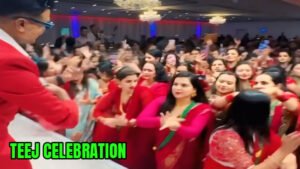Teej is an important festival celebrated mainly in India and Nepal. It is especially popular among women, who observe this festival with great enthusiasm. The festival marks the arrival of the monsoon season and is a time for joy, fasting, and traditional rituals.
Teej usually falls in the month of August or September. The festival is dedicated to the goddess Parvati, who is known for her devotion and love for Lord Shiva. Women celebrate Teej to honor Parvati and to seek her blessings for a happy and prosperous life.
One of the most notable aspects of Teej is the fasting ritual. Women fast from sunrise to sunset, refraining from eating or drinking. This fast is seen as a way to purify the body and soul, and it is believed to bring good luck and happiness to their families. The fast is often followed by a grand feast once the day ends.
During Teej, women dress in beautiful traditional clothes, usually in shades of red, green, or yellow. They adorn themselves with jewelry and apply henna (mehndi) to their hands and feet. The colorful attire and intricate henna designs add to the festive atmosphere.
The celebrations include singing, dancing, and participating in various traditional games. Women gather together to sing devotional songs, dance in a circle, and share stories. These activities create a lively and joyful environment, reflecting the spirit of the festival.
Another significant aspect of Teej is the exchange of gifts. Women give each other sweets, fruits, and small presents as tokens of love and affection. This exchange strengthens bonds of friendship and family.
Teej is not just about rituals; it also emphasizes the importance of community and togetherness. It is a time for women to come together, support each other, and celebrate their cultural heritage. The festival brings families closer and reinforces traditional values.
In conclusion, Teej is a festival filled with joy, tradition, and cultural significance. It is a time for women to celebrate their devotion, enjoy traditional activities, and strengthen their bonds with family and friends. Through its rich customs and vibrant celebrations, Teej continues to be an important and cherished festival in the lives of many. 

![setopati.com logo {"remix_data":[],"remix_entry_point":"challenges","source_tags":["local"],"origin":"unknown","total_draw_time":0,"total_draw_actions":0,"layers_used":0,"brushes_used":0,"photos_added":0,"total_editor_actions":{},"tools_used":{"transform":1},"is_sticker":false,"edited_since_last_sticker_save":true,"containsFTESticker":false}](https://setopatimedia.com/wp-content/uploads/2024/08/setopati.com-logo.jpg)